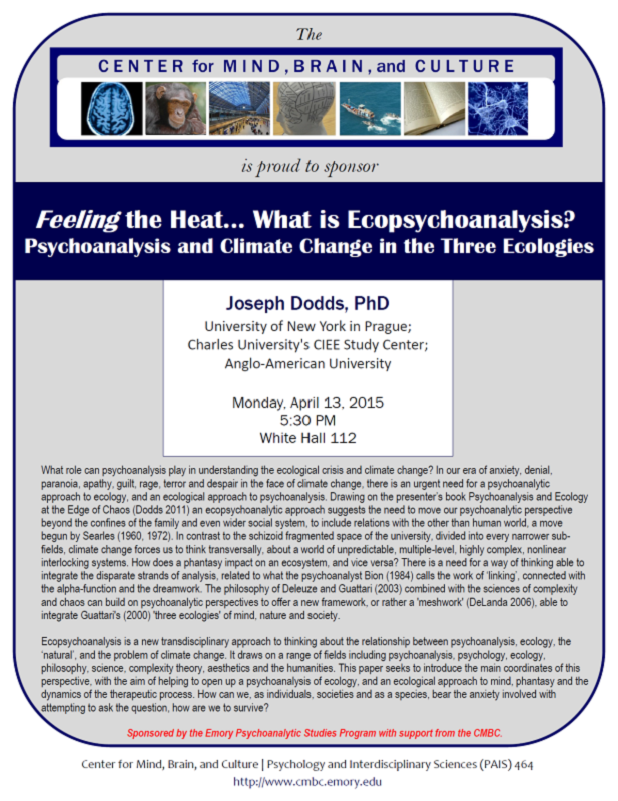Lecture: "Feeling the Heat... What is Ecopsychoanalysis? Psychoanalysis and Climate Change in t
- emorygsg
- Apr 3, 2015
- 2 min read

The Psychoanalytic Studies Program cordially invites you to a lecture by
Dr. Joseph Dodds
"Feeling the Heat... What is Ecopsychoanalysis? Psychoanalysis and Climate Change in the Three Ecologies"
Monday, April 13, 2015 at 5:30 PM
WHITE HALL 112
What role can psychoanalysis play in understanding the ecological crisis? In our era of anxiety, denial, paranoia, apathy, guilt, rage, terror and despair in the face of climate change, there is an urgent need for a psychoanalytic approach to ecology, and an ecological approach to psychoanalysis. Following from the presenter’s book Psychoanalysis and Ecology at the Edge of Chaos, an ecopsychoanalytic approach suggests the need to move our psychoanalytic perspective beyond the confines of the family and even wider social system, to include relations with the other than human world. Climate change forces us to think transversally about a world of unpredictable, multiple-level, highly complex, nonlinear interlocking systems. How does a phantasy impact on an ecosystem, and vice versa? How can we integrate what Guattari's (2000) calls the 'three ecologies' of mind, nature and society? Ecopsychoanalysis is a new transdisciplinary approach to thinking about the relationship between psychoanalysis, ecology, the ‘natural’, and the problem of climate change, drawing on psychoanalysis, philosophy, science, aesthetics and the humanities. This paper seeks to introduce the main coordinates of this perspective, and asks us, as individuals, societies, and as a species, if we can find a way to bear the anxiety involved with asking the question, how are we to survive?
Ecopsychoanalysis is a new transdisciplinary approach to thinking about the relationship between psychoanalysis, ecology, the ‘natural’, and the problem of climate change. It draws on a range of fields including psychoanalysis, psychology, ecology, philosophy, science, complexity theory, aesthetics and the humanities. This paper seeks to introduce the main coordinates of this perspective, with the aim of helping to open up a psychoanalysis of ecology, and an ecological approach to mind, phantasy and the dynamics of the therapeutic process. How can we, as individuals, societies and as a species, bear the anxiety involved with attempting to ask the question, how are we to survive?
Dr. Joseph Dodds is a Chartered Psychologist (CPsychol) and Associate Fellow (AFBPsS) of the British Psychological Society, a Candidate Member of the Czech Psychoanalytical Society (IPA), and on the management committee of the Climate Psychology Alliance. He is a psychotherapist in private practice, and lectures in various courses in psychology and psychoanalysis at the University of New York in Prague (SUNY), the CIEE Study Centre, Charles University, and the Anglo-American University. Dr. Dodds is author of the book Psychoanalysis and Ecology at the Edge of Chaos: Complexity Theory, Deleuze|Guattari and Psychoanalysis for a Climate in Crisis (2011, Routledge), and several other articles and book chapters on psychoanalytic applications to neuroscience, culture, society, art, film, and ecology. Currently, the center of his research is on the affective, unconscious, aesthetic, and psycho-social dynamics of climate change.
This event is cosponsored by the Department of French & Italian, Sustainability Initiatives, the Center for Mind, Brain & Culture, the Department of English, and the Department of Anthropol































Comments